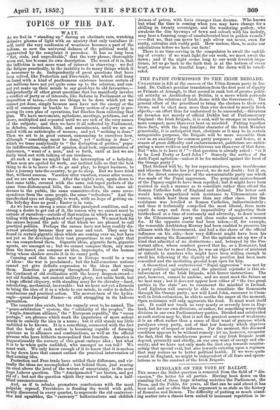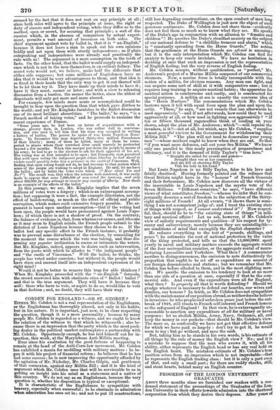KINGL A 1CP, ON THE VOTE BY BALLOT. THE sooner
the Ballot question is removed from the field of " dis- cussion," the better for all parties. Having been down on the standing list of those huge debating societies the Parliament, the Press, and the Public, for years, all that can be said about it has been said, and so often that the argument is as stale as the history of Romulus and Remus. The difficulty of putting so much stand- ing matter into a classic form suited to incessant repetition is in- creased by the fact that it does not rest on any principle at all ; since both sides will agree to the principle at issue, the right or duty of sincere and independent voting, while they differ as to the method, open or secret, for securing that principle ; a sort of dis- cussion which, in the absence of comparison by actual experi- ment, permits a vast amount of looseness on both sides. The chief argument against vote by ballot is, that it is " because it does not leave a man to speak out his own opinions boldly and act upon them with sturdy independence ; as if plain outspeaking and independence were already and practically the rule with us ! The argument is a mere assumption in the teeth of facts. On the other hand, that the ballot would supply an independ- ence which is not in the men themselves, is an evident fallacy. The secret vote would not, we believe, make half the difference that either side supposes; but some millions of Englishmen have an idea that it would be very advantageous to them, and that idea is so fixed in their heads that the only way to get it out thereof will be to let them try it. They have made up their minds to have it ; have it they must, sooner or later; and with a view to releasing discussion from a burden, the sooner the better, since the ablest of disputants will only get more and more absurd. For example, few minds more acute or accomplished °mild be brought to bear upon the question than that which gave Euthen to the world; and yet Mr. Kinglake furnishes to the Ballot discussion one of its most brilliant absurdities. " The ballot," he says, " is a French method of taking votes," and he proceeds to examine the recent experience of France. "Some years ago, he had been on terms of acquaintance with a strange, gloomy man, in London, who was rather dull in conversa- tion, and who used to tell him that his time was occupied in writing a history of battles. The person he spoke of was Louis Napoleon Bona- parte. In December this man deprived thirty-five million Frenchmen of their liberty ; many of them he killed, many of them he trans- to places where their wretched lives could scarcely be protracted trans- ported beyond a few months. When this usurper put down the people by means of his army, he had to go to the electors to ask for their approval of his act. The votmg was at first intended to be open ; but Bonaparte soon perceived that with open voting the indignant people whose liberties he had dared to violate would speedily lodge him a prisoner in the castle of Vincennes. Well, finding that open voting would not do, he had recourse to that system which some of the people are wishing to adopt in England. He said, let me have the ballot ; and by ballot the votes were taken. ("Bow about Yes and Ago 7") The result was, that when the returns were rendered, it was easily made to a ar that some 7,000,000 of men voted for tyranny, and only about 500, I i i for any attempt to recover any vestige of liberty. Now there is an example of the effects of the ballot."
In this passage, we see, Mr. Kinglake implies that the seven millions of votes were a forgery ; which is an extravagant assump- tion; but supposing it were a fact, the example illustrates, not the effect of ballot-voting, so much as the effect of official and public corruption, which makes such extensive forgery possible. The ar-
ent is based upon another assumption—that if the voting had been open, the people would have pronounced against Louis Napo- leon ; of which there is not a shadow of proof. On the contrary, the balance of evidence is, that, from whatsoever causes, and irksome as it may seem to English minds, the French people submit to the dictation of Louis Napoleon because they choose to do so. If the ballot had any specific effect in the French instance, it probably was to prevent some disturbance at the election, by concealing for the moment the course which the vote was taking, and thus dis- arming any popular inclination to coerce or intimidate the voters. But Mr. Kinglake, indeed, appears to desire such an intervention, from the gusto with which he alludes to " the indignant people" and "the castle of Vincennes." With the ballot, he thinks, the people has voted under coercion; but without it, the people would have risen and coerced itself into an independent expression of its right mind !
-Would it not be better to remove this trap for able thinkers ? When Mr. Kinglake proceeded with the " un-English " formula, the crowd answered him with obstinate cries of " Ballot ! ballot !" and that is the true argument. They will have it because they will: those who have to vote, or aspire to do so, would like to vote in that fashion ; and, no doubt, they will have their way.



























 Previous page
Previous page